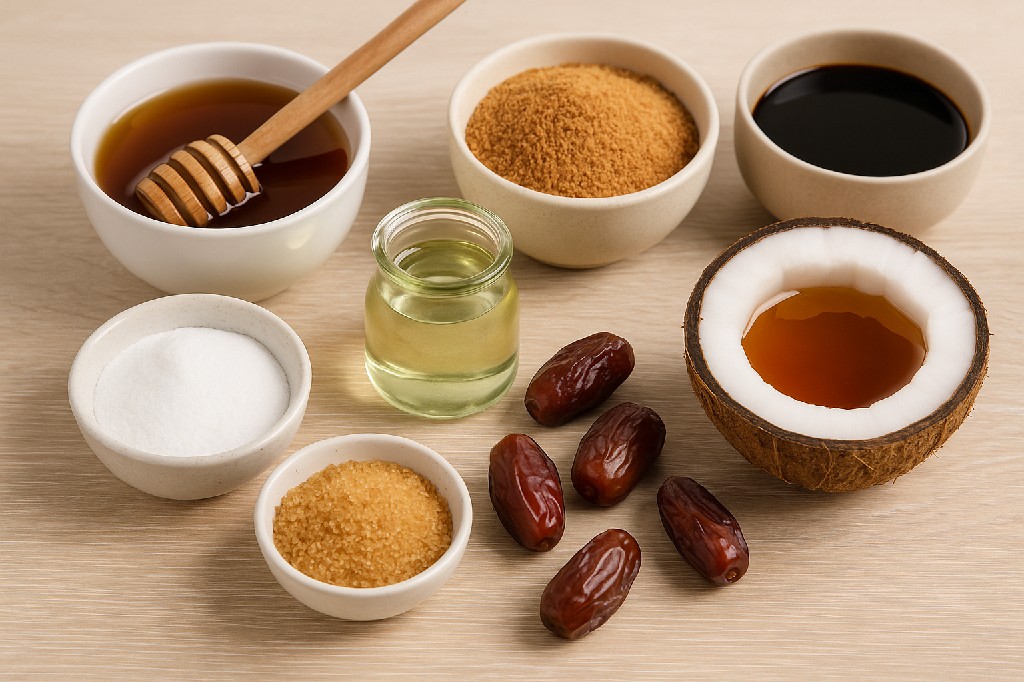Best Natural Sugar Alternatives Today
Craving something sweet doesn’t always mean you need to reach for refined sugar. In fact, more people than ever are seeking natural sugar alternatives to satisfy their sweet tooth while staying healthy. Whether you’re managing blood sugar, reducing calorie intake, or just avoiding processed foods, there are many natural options available. In this article, we’ll explore the most effective and delicious natural sugar alternatives, so you can indulge without the guilt.

Why Choose Natural Sugar Alternatives?
First and foremost, reducing refined sugar offers health benefits. While occasional indulgence isn’t harmful, chronic consumption of added sugars can contribute to weight gain, inflammation, insulin resistance, and even mood swings. Fortunately, natural sugar alternatives can help you enjoy sweetness with fewer drawbacks.
Moreover, many of these substitutes contain essential nutrients, lower glycemic indexes, and even antioxidants. Therefore, they’re ideal for people with diabetes, weight management goals, or those pursuing a whole-foods lifestyle.
Stevia: A Popular Natural Sugar Alternative
One of the most popular natural sugar alternatives is stevia, a plant-based sweetener derived from the Stevia rebaudiana plant. It’s up to 300 times sweeter than sugar but contains zero calories.
Because stevia doesn’t spike blood sugar levels, it’s especially suitable for diabetics. In addition, many studies suggest it may help reduce blood pressure. Stevia is available in liquid drops, powders, and blends with other natural sweeteners. However, be aware: some blends contain added sugar alcohols, which may cause digestive discomfort in large amounts.
Raw Honey: Sweetness with Antioxidants
Although honey contains calories and sugars, it’s considered one of the best natural sugar alternatives due to its added health benefits. Raw honey provides enzymes, antioxidants, and trace minerals like iron and zinc.
Still, moderation is key. Despite being a natural product, honey raises blood sugar levels similarly to regular sugar. That said, its slower absorption rate and nutritional content make it a better option overall. Choose raw, unfiltered honey to maximize benefits.
Maple Syrup: Natural Sugar Alternative with Minerals
Another tasty and nutrient-packed option among natural sugar alternatives is pure maple syrup. Sourced from tree sap, this syrup contains antioxidants and essential minerals like manganese, calcium, and zinc.
Unlike refined sugars, maple syrup has a rich, caramel flavor, making it perfect for pancakes, oatmeal, or baking. Just be sure to avoid commercial “pancake syrups” made from high-fructose corn syrup. Opt for Grade A or B 100% pure maple syrup for the healthiest option.
Coconut Sugar: A Low-GI Sweetener
Coconut sugar is made from the sap of coconut palm flowers. It has become a favorite among healthy eaters looking for natural sugar alternatives that won’t spike blood sugar levels. Its glycemic index is significantly lower than that of white sugar.
Coconut sugar also retains small amounts of minerals like iron and potassium. Its flavor resembles brown sugar, with subtle caramel notes. Because it measures one-to-one like sugar, it’s easy to substitute in recipes.
Dates and Date Syrup: Whole Food Sugar Alternative
Dates are whole fruits, which means they come with fiber, vitamins, and antioxidants. Because of this, they’re one of the healthiest natural sugar alternatives available.
They can be blended into smoothies, chopped into oatmeal, or used to make homemade date syrup. In fact, date syrup is becoming increasingly popular as a liquid sweetener that still contains the nutritional benefits of whole dates. While dates are high in natural sugars, their fiber content helps reduce rapid blood sugar spikes.
Monk Fruit: Another Zero-Calorie Sugar Alternative
Monk fruit, also known as luo han guo, is a small melon native to Southeast Asia. Its extract contains compounds called mogrosides, which are intensely sweet but contain zero calories and carbohydrates.
Because monk fruit doesn’t affect insulin levels, it’s ideal for keto, diabetic, or low-carb lifestyles. Many products combine monk fruit with erythritol, another sugar alcohol, for a balanced taste. As with stevia, be cautious of potential digestive upset if consumed in excess.
Sugar Alcohols as Natural Sugar Alternatives
While not technically “natural” in their processed form, sugar alcohols like erythritol and xylitol are often included in discussions about natural sugar alternatives. Erythritol has nearly zero calories and doesn’t affect blood glucose levels. Xylitol, on the other hand, has about 40% fewer calories than sugar.
Both can be used in baking and beverages. However, they may cause bloating or gas in sensitive individuals, especially if consumed in large quantities. Despite this, they remain popular due to their close similarity in taste and texture to sugar.
Molasses: An Underrated Natural Sweetener
Molasses, a byproduct of sugarcane processing, may surprise you as one of the more nutritious natural sugar alternatives. It retains many vitamins and minerals lost during sugar refinement, such as iron, calcium, magnesium, and potassium.
Its robust, smoky flavor pairs well with baked goods, barbecue sauces, and even smoothies. Choose blackstrap molasses for the highest nutrient density, but use it sparingly due to its intense taste.
Fruit Purées as Natural Sugar Alternatives
For those wanting the most natural choice, fruit purées like mashed bananas, applesauce, or pureed mango are ideal natural sugar alternatives. They contain fiber, vitamins, and natural sugars that are easier on the body.
These are particularly effective in baking, where they can replace both sugar and fat in some recipes. For example, using applesauce in muffins can reduce calories and improve moisture. Just be sure to use unsweetened purées for maximum health benefits.
Agave Syrup: A Cautionary Sweetener
Agave syrup is often marketed as one of the best natural sugar alternatives, but it comes with caveats. While it’s lower on the glycemic index than table sugar, it’s also very high in fructose, which may contribute to insulin resistance when overconsumed.
If you choose agave, use it sparingly. It’s best reserved for occasional use rather than daily consumption. Always opt for organic, raw agave nectar to avoid heavily processed versions.
Tips for Using Natural Sugar Alternatives
Transitioning to natural sugar alternatives doesn’t need to be complicated. Here are a few helpful strategies:
- Start slowly: Your taste buds need time to adjust to less sweetness.
- Experiment: Try different options in coffee, tea, baking, or dressings to find your favorite.
- Read labels: Look for 100% pure products with no added sugars or fillers.
- Combine substitutes: Sometimes a blend (e.g., stevia and erythritol) provides the best taste and texture.
Most importantly, aim for moderation. Even natural sweeteners can contribute to cravings or excess calorie intake if not used mindfully.
Conclusion: Sweeten Smartly and Naturally
Choosing natural sugar alternatives is a smart step toward better health, improved energy, and long-term wellness. Whether you prefer stevia, honey, coconut sugar, or fruit purée, each option offers its unique benefits.
By replacing refined sugar with more nutritious and blood-sugar-friendly choices, you’re supporting your body while still enjoying the pleasure of sweetness. As always, listen to your body and adjust based on how you feel. After all, a balanced approach is the sweetest success of all.
You might also be interested in:
